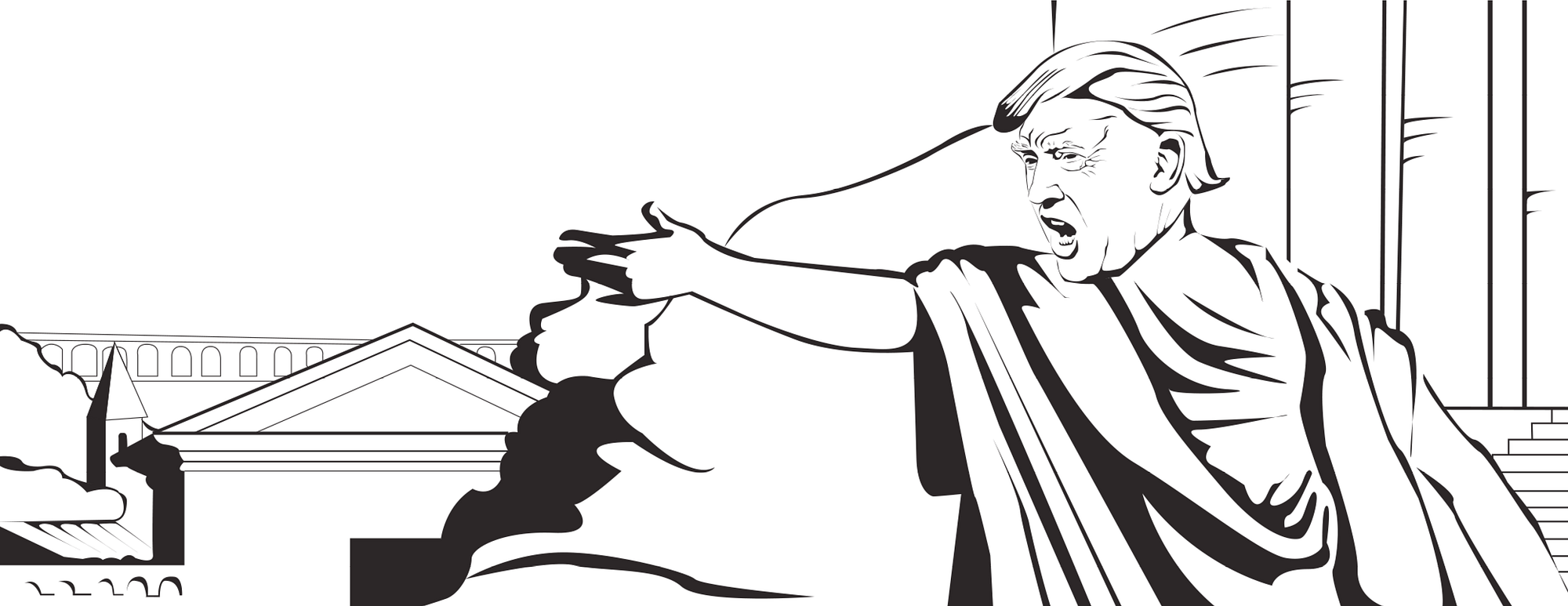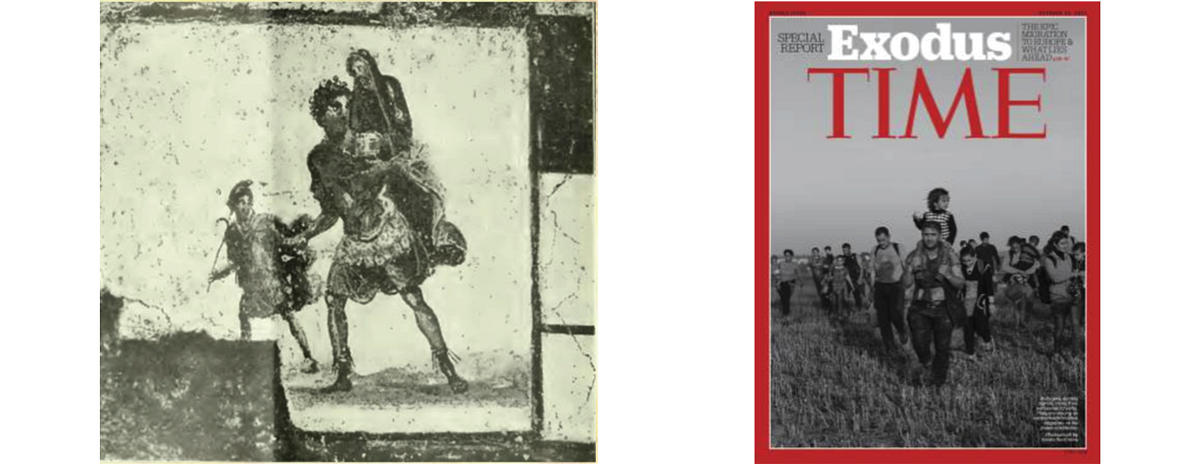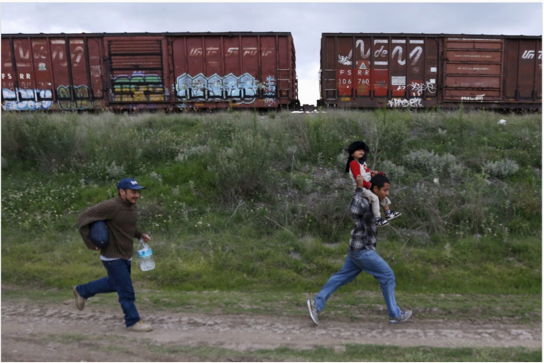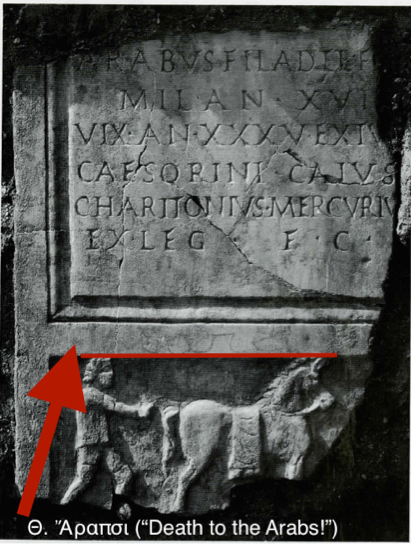
Fears of immigration in ancient Rome and today
Migrants poured over the southern border. Many came for jobs after employment options in their home regions had dried up; others were attracted to the excitement and glamour of their destination. Soon the influx began to worry leading politicians, who authorized a series of enforcement actions against select categories of immigrants. Deportations, they believed, would put an end to the mess. No luck: undeterred, the immigrants kept coming.
At last, one politician ventured a proposal. Why not extend the citizenship? Not to all non-citizens, of course — just to one specific, carefully circumscribed subset. But one party was having none of it: “if you give them citizenship,” the party’s spokesman insisted, “you assume (I think) that you’ll still have the same political rights and worship in the same way as you do now. But don’t you realize that those people will take over everything?” The proposal withered on the vine.
The speaker of these lines was Gaius Fannius, consul in 122 BCE and a dogged opponent of Gaius Gracchus’ proposal to extend the citizenship to Rome’s Latin allies. For all its celebrated inclusivity, ancient Rome had residents and leaders who were none too pleased about the continuous stream of immigrants: Fannius’ warning is a distant echo of Donald Trump’s “we either have a country or we don’t have a country.” Romans were as willing as many Americans are today to give this displeasure political and legal expression.
But why undertake this rewriting of late republican Rome in the first place? Partly because in doing so I join a modern conversation about immigration that — in both Europe and America — regularly and explicitly adduces parallels from the ancient world as justification for various kinds of immigration policy. In this article, I’ll examine the sentimental and rhetorical configurations through which ancient Rome (and Greece) are put to work in contemporary discussions of immigration and outline how Romans themselves perceived and responded to immigration during the Republic and Empire. In a second, follow-up article, I’ll explore how mobility in the ancient Mediterranean structurally mirrored 21st-century migration towards Europe and the United States. Ancient history can clarify how we think about recent developments, just not in the way(s) normally assumed.
Let me stress that my own perspective as a formerly undocumented immigrant with emphatically pro-migrant political commitments informs what and how I write. No Tacitean disavowal of bias for me. But I hope that even those who do not share my views on immigration will consider how antiquity can be repurposed in modern conversations about immigration.

Writing in the pages of The Wall Street Journal, Cambridge classicist Mary Beard recently asserted that the Romans “would have been puzzled by today’s hostility to migrants.” Well before the publication of the op-ed, Beard made use of her status as one of Britain’s foremost public intellectuals to offer a liberal perspective — sometimes greeted with viciously misogynistic hostility — on contemporary migrant and refugee matters.
The tradition of roping the ancient world into assessments of modern immigration has been a fixture of British political and cultural discourses for quite some time: Enoch Powell’s infamous 1968 “Rivers of Blood” speech (complete with Vergilian allusion) standing at one end of the political spectrum, with Boris Johnson’s 2006 Dream of Rome closer to the other. As Mayor of London, Johnson has continued beating the classical drum, issuing warnings that Britain will turn into the ancient state least like Rome in its treatment of foreigners — Sparta — should it adhere to plans to reduce its net migration.
On the other side of the Atlantic, another professional classicist has intervened in the immigration debates: Victor Davis Hanson. Not one to be deterred by the prospect of controversy, Hanson waded into the immigration-policy waters with his 2003 hybrid-genre book Mexifornia. After first observing that “America is what Rome once was to hustling Jews, Greeks and Numidians” (p. 51), Hanson goes on to claim in his epilogue that the “freedom and material dynamism of the West are drawing millions to its shores — in the manner that Athens once attracted metics from Asia, and Rome drew Africans, Jews and Armenians” (p. 142). (And as proof that classicists holding forth on immigration can irritate members of the political establishment, one need look no further than Hanson: after introducing himself as a “classicist” at a Capitol Hill briefing the year of his book’s publication, Hanson was reportedly accosted by a Congressional staffer who thought he had heard Hanson term himself a “classist”; the face-off ended with the staffer exiting the briefing in anger.)
Comparisons of modern America to ancient Rome are, of course, nothing new, and so hackneyed by now as to inspire a book-length rebuttal. But in recent decades many of these comparisons have been fueled by anxieties about immigration, particularly of the illegal/undocumented variety. Actress and conservative politician Clare Boothe Luce expressed concern in a 1982 Washington Post interview that the United States might be headed “for the fate of ancient Rome … a city of pollution and noise and foreigners, [that] collapsed under the weight of the barbarians.”
Since 9/11, the argument that a lax immigration policy will hasten the United States’ Rome-like demise has steadily gained traction. A 2004 Florida Times-Union editorial on “illegal immigration and the problems that go with it” ended on this ominous note: “ancient Rome couldn’t, or wouldn’t, stop the influx of barbarians across its border.” Taking to The Washington Post in 2007 to outline a “tolerant but also tough” vision for US immigration policy, Yale Law School professor Amy Chua reminded her readers that the “greatest empire in history, ancient Rome, collapsed when its cultural and political glue dissolved … [i]n part, this fragmentation occurred because of a massive influx of immigrants from a very different culture.” Three years later, Stevens Institute of Technology professor Silvio Laccetti argued that Rome’s extension of its citizenship through the Edict of Caracalla had precipitated an “erosion of civic pride and responsibility” in the course of outlining his own proposal of a tolerant but tough immigration scheme. And in undoubtedly the most entertaining riff on the Rome conceit, Senator Ted Cruz (R-Texas) went full Cicero on the Senate floor — framing Obama as Catiline — following the President’s November 2014 announcement of an executive order deferring the deportation of undocumented parents of American citizens and permanent residents.
You wouldn’t be wrong to suspect that the genealogy I’ve charted so far has an even deeper history: the practice of invoking the Roman Republic and Empire’s treatment of immigrants as paradigmatic and/or cautionary is already on display in the state- and nation-building discourses of the early modern period. Edward Gibbon’s Decline and Fall of the Roman Empire reserves the purplest of its purple prose for the barbarians at the gate and the Fifth Column of immigrant slaves and domestics waiting to welcome them. (Last year, a lengthy rumination — sprinkled with block quotations from Decline and Fall — on Gibbon’s continuing relevance was posted to breitbart.com under the pseudonym “Virgil” and triggered over 1400 comments, mostly effusions of agreement.) Before Gibbon, Montesquieu had sketched the contribution of foreigners and barbarians to Rome’s imperial dissolution in chapter 16 of his Considerations on the Causes of the Greatness of the Romans and their Decline.
But well before either, Machiavelli had taken a somewhat different line on immigration in Discourses on Livy, praising Rome’s openness to foreigners as integral to the amassing of the military and economic power through which the republic set itself apart from Athens and Sparta (II.3). Machiavelli wasn’t just anticipating Boris Johnson’s evaluation of Roman greatness as a consequence of open migration. Diligent reader of Livy that he was, Machiavelli was putting his finger on a line of argument that reached back to the ancients themselves.
The history of rhetorically positioning Rome’s treatment of immigrants really begins in antiquity, with both Greeks and Romans chiming in on the fluctuating — and at times very divergent — trends in the Republic and Empire’s openness. Having worked our way backwards in time to the ancients, we should now pause and ask: how open were Romans to foreigners, really? It turns out that Romans were far more ambivalent about immigration than some moderns give them credit for.

In the first decade of the war with Hannibal, a Macedonian king turned Roman adversary praised the Republic’s free and easy bestowal of citizenship in a letter exchange with a Greek city-state. In a world where city-states could be quite stingy with grants of citizenship — especially Sparta, notorious for its deportations — Rome had so succeeded in marketing itself as exceptional that even an enemy felt compelled to take notice. This marketing took several forms, and the one that has left the most durable imprint on literary and non-literary sources alike is Rome’s origin myth.
In contrast to the Greek city-states whose origin stories indulged the fantasy of autochthony (according to which a community and its members sprang up from the earth in the place they inhabited), Rome promoted itself as the product of immigrants. Molded during the turbulent centuries of Italian and Mediterranean expansion, Rome’s legendary history began with an illegal immigrant: pious Aeneas, fleeing with his family and friends from the devastation of Troy household gods in hand, elderly father on his back, young son by his side.


As canonized in the Aeneid, the challenges faced by the founder of the Roman race include some of the traditional (epic) dilemmas of travel — where to go and how long to stay, whose hospitality to accept and whose to decline — Homeric effects translated for a Roman audience. And once Aeneas and his band do arrive on Italian shores, they are denied the happily-ever-after outcome. Their lot is to contend with belligerence, grief, early death.
Some months ago, Michael Fontaine proposed in this publication a reading of the Aeneid’s second half that aligns rather felicitously with contemporary geopolitical events. On one level, the Aeneas myth internalizes the plight of immigrants/refugees (fato profugi); at the same time, it gives form to the mirror anxiety of those native residents who from the first encounter feel that the new arrivals will take their land and resources and women.
Spinning out this thread further, I’d add that the ambivalence towards refugees and immigrants woven into the Aeneas legend reflects centuries of unease at Rome about the presence and role of foreigners. The unease was embodied in the mythic personas of Aeneas, Romulus, and Remus, all three of whom were remembered as thieves, rapists, and murderers. Here comparison with the modern myth of the immigrant as criminal is instructive. Earlier this year, to thumps and cheers, Trump laid out his campaign platform on immigration:
“The U.S. has become a dumping ground for everybody else’s problems…When Mexico sends its people, they’re not sending their best…They’re sending people that have lots of problems, and they’re bringing those problems with us [sic]. They’re bringing drugs. They’re bringing crime. They’re rapists. And some, I assume, are good people.”
Trump and his partisans seem to have a complementary myth at hand: the “Ellis Island” arrivals of virtuous character and exemplary work ethic (unlike today’s purveyors of drugs and crime). Much the same conflict between these two alternate ideals of the immigrant played out in ancient Rome. As Rome expanded, nativist and xenophobic discourses proliferated, with consequences for the waves of immigrants settling down in Rome in the last centuries of the Republic and first few centuries of the Empire.
These discourses had sharp legal teeth. On top of the targeted removals and expulsions of groups identified as religiously and/or philosophical suspect — the Bacchants in 186 BCE, philosophers in 161 and 154, Chaldaeans and Jews in 139 — immigrants hailing from communities elsewhere in Italy were deported on multiple occasions in the years 187–172 (citations and discussion: Noy, Foreigners at Rome, pp. 37–47). Sometime in the 120s, a law was passed expelling all foreigners from the city of Rome; another version of the law was passed in 65 BCE. Thanks to the Severan-era historian Cassius Dio, we know something of the reasons for the second law’s passage (37.9): not only were foreigners believed to be too numerous, it was worried that they weren’t suitable enough (epitedeioi) to live alongside Romans.
It’s worth remembering that throughout this entire time Rome still had a republican system of government. These laws were ratified by popular will and not autocratic imposition. Since foreigners couldn’t necessarily be identified on sight (any romano di Roma stood a decent chance of being physically indistinguishable from an immigrant), it is anyone’s guess how these laws were enforced. The association of specific neighborhoods with certain groups of immigrants may have played a role in the orchestration of round-ups.
We do know that one Roman witness to the law of 65 did not like what he saw. Characterizing this law and its predecessor from the 120s as designed not only to deny foreigners access to Rome but to deport those already living there (eosque exterminant), Cicero declares in the De officiis that “denying foreigners access to our city is patently inhumane” (3.11.47). Although he managed to successfully defend the poet Aulus Licinius Archias from deportation, Cicero laments in a letter to his friend Atticus that the same law had been deployed, out of spite, to condemn (and presumably deport) a freedman assistant to the politician and former consul Aulus Gabinius after Gabinius beat charges of political corruption.
Neither the moral nor rhetorical authority of Cicero could halt the policing and deportation of certain categories of immigrants; the practice persisted well into the Empire. Yet immigrants kept on coming. The satirist Juvenal’s bombastic xenophobe Umbricius couldn’t abide their presence: “Romans, I can’t tolerate the city being Greek. Yet what portion of the shit is really Greek? For a long time now the Syrian Orontes has poured into the Tiber…” (Sat. 3.58–60). But for the Greek-speaking author of The Learned Banqueters, it was precisely Rome’s embrace of different immigrant populations that enhanced its glory: it was a heavenly city, encompassing so many foreign populations as to defy enumeration (Deipn. 1.20b-c).
We should be careful to respect the differences between ancient Rome and the modern US (or Europe). For example, the preoccupation with “border enforcement” wasn’t quite as intense among the Romans — though perhaps the time has come to read Augustus’ reported advice to Tiberius to “keep the empire’s borders secure” (my consciously tendentious rendering of Tacitus’ enigmatic coercendi intra terminos imperii) and/or Aelius Aristides’ praise of the Empire’s walls in his Roman Oration as implicated in a kind of border politics. And at no point in its trajectory from Republic or Empire was Rome a nation in the modern sense.
But with these caveats out of the way, I want to underline a few fundamental similarities between the immigration sensibilities of ancient Rome and those of 21st-century America. Then as now, foundation myths about the state as the creation of immigrants articulated and projected deeply felt anxieties about the legacy of past immigrants and the presence of current ones. Then as now, some of those anxieties were worked out through legal-administrative means, with deportation privileged as a technology of control. Then as now, foreigners stood to lose the most in confrontations between political elites — think back to Gabinius’ freedman. Then as now, the immigrant influx could inspire despair over the country going to rot or euphoria at its cosmopolitan inclusivity. Then as now, immigrants were vulnerable to hate crimes.
Hate crimes, you say?


Earlier this year, “Death to Islam” was spray-painted on the wall of the Bosnia and Herzegovina Heritage Association center in Spokane, Washington. Thousands of hate crimes are reported in the United States each year. These figures — dismayingly consistent from year to year — probably underrepresent the true number of hate crimes perpetrated. Setting aside for now the reliability of the FBI statistics, I want to concentrate on the graffito as medium for xenophobia. Even for the spray-painter, there is ancient precedent.

At some point during the second century CE, a tombstone was set up in Rome under the supervision of a certain Charitonius Mercurius for a deceased cavalry officer. From the tombstone we learn that the officer — whose name is not preserved in what remains of the inscription — was of Arabian extraction (natione Arabus); he’d lived to the age of 35, soldiering for 16 of those years and attaining the rank of eques singularis along the way. Many examples of this type of inscription survive, but in this case the real kicker comes in the form of a Greek graffito left behind by someone, possibly a fellow cavalry officer, that reads: Θ. Ἄραπσι (“Death to the Arabs!”).
The cultural and linguistic complexities of xenophobic resentment in Imperial Rome were such that a Greek-speaking resident of Rome could scrawl an ethnic taunt on a monument to a Latin-speaking native of the Near East. Romans were quite skilled at the use of graffiti to mock the immigrant Other: the late second/early third-century CE graffito from the Palatine featuring a donkey on a crucifix and the tag (again in Greek) “Alexamenos worships God” may be the earliest example of such visual denigration being applied to Greek-speaking Christians residing in Rome — and takes us back to the anxiety voiced by Gaius Fannius that immigrants would menace religious practices at home.
But my interest in summoning up the ghost of the graffito artist who marked up the tombstone has to do with the fantasy of violence folded into the tag. The cavalry officer was already dead, else he might have had a thing or two to say to the violator of his memorial. Alive and far more vulnerable was the homeless Mexican man recently beaten by two Boston men, one of whom claimed as his inspiration Donald Trump’s call to deport the undocumented.
Trump’s rhetoric justifies the commission of acts of violence against immigrants by characterizing them as inherently violent. On the stump, he has bemoaned the scourge of rapists, murderers and thieves originating not only in Mexico but “coming from all over South and Latin America and … coming probably, probably, from the Middle East.” It doesn’t seem to register among his fans that the “problem” of immigrant crime is a fiction: multiple studies carried out over the past century have repeatedly confirmed that immigrants commit crime at lower rates than the general population. What does register is the fear-mongering, especially among those already inclined to believe that white Americans are endangered: in July a petition was posted to WhiteHouse.gov asking President Obama to honor Trump “for opposing white genocide.”
Once the immigrant is construed as an existential threat, xenophobic sentiment rallies around the idea of removing that threat by any and all means necessary. Both in ancient Rome and in modern America, the fear of immigrants activates not only the desire to remove their bodies from sight through deportation, but to deprive them of life — to destroy them.

Trained as a Roman historian at Princeton (A.B.), Oxford (M.Phil.), and Stanford (Ph.D), DAN-EL PADILLA PERALTA is a Mellon Research Fellow in the Society of Fellows and Lecturer in Classics at Columbia University, where he researches and writes on a variety of topics. In the fall of 2016 he will begin a tenure-track appointment in Classics at Princeton. Undocumented, his memoir of growing up without legal immigrant status in New York City, was published in July by Penguin Press. His monograph on Roman Republican religion is under contract with Princeton University Press.
The author would like to thank Michael Fontaine for comments on an earlier draft and a warm and engaged audience at the University of Nebraska-Lincoln for their immensely stimulating feedback.

The views expressed in this article are those of the author and do not reflect the views of the Paideia Institute.



